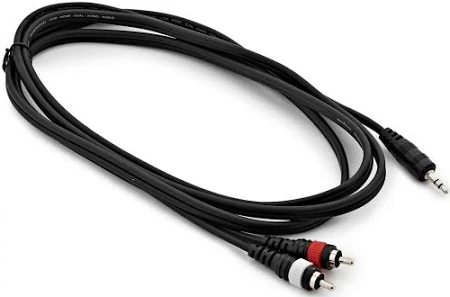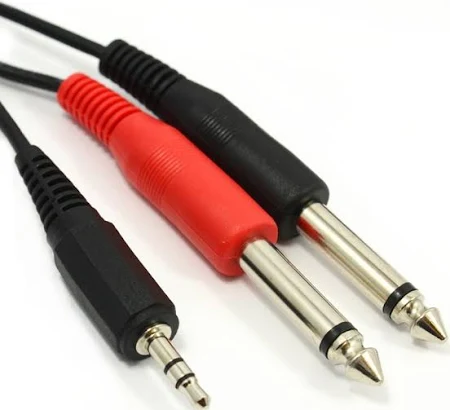I have a Fender Champion 20 guitar amp and a Pyle Professional PAD43MXUBT mixer. This mixer doesn't have a HiZ guitar button on either of the channels. I haven't plugged the guitar into the channel and increased the gain to see if it gets enough signal. If it doesn't, can I take the headphones out from the amp and go into the mixer's line input on channel 1 or 2?
Tags
Comments
It's actually not my mixer,…
It's actually not my mixer, I'm helping someone set it up for guitar lessons via Zoom. As to your solution, you totally lost me in the explanation, what is a "dual lead 3-pole 3.5mm minijack"? I wanted to use channel 1 or 2 of the mixer as those have EQ. But you're saying to use either the Line In or 2-TK inputs? He will also need to plug in a line from his laptop to play backing tracks, so I'm not sure if this mixer can take multiple line in inputs?
I have a Fender Champion 20…
I have a Fender Champion 20 guitar amp and a Pyle Professional PAD43MXUBT mixer.
That's where I got the ownership information.
Here's what I was talking about for the cable. This will work for the stereo backing track feed from the laptop line out or from the headphone jack to the mixer:

The information that you didn't mention in your original post is that you need to use the mixer EQ, which is only available on channels 1 and 2. For that, you would need what is known as an insert cable, such as this one configured as a minijack plug to 2x TS ("mono") 1/4" plugs:

If the Champion amp really does put out the same signal on the L and R headphone outs, then you would only need to plug one of the 1/4" plugs into the line input socket of either channel 1 or 2 on the mixer, and leave it panned to centre. Wrap a piece of masking tape round the dangling loose plug contacts to avoid shorts. If the amp's internal effects are stereo, then additionally use the second 1/4" plug into the other mixer channel, and pan them L and R.
Got it, thank you for the…
Got it, thank you for the clarification on that. He actually needs to connect his guitar, his mic, and his laptop/phone. So can he get a single mini stereo to single 1/4" TS for the amp headphones out to ch1 of the mixer, then his mic into ch2, then his laptop/phone into the line in RCA input?
Not without risking damage…
Not without risking damage to the Champion amp.
You can't buy a minijack "stereo" plug to single 1/4" TS plug, because where would the ring contact on the minijack connect to? You can get a mono 1/4" plug to 1/8" plug cable, but plugging that into the headphone output of the amplifier shorts the right channel output to ground since there is grounded sleeve where it is expecting a ring contact.
If you were thinking you could use a balanced 1/8" to 1/4" lead (which has 3-pole jacks on each end), the mixer would take the difference between the L and R amp outputs, which in the case of the mono guitar signal would be zero.
Your choice really is either to wire your own cable or to use the insert cable with one TS plug dangling. Even taking wire cutters to the dangling plug lead would risk leaving a short from the braided screen wire to the centre conductor. Having said all that, years ago I remember seeing a 1/8" adaptor plug that performed the L-R split. I think it may have been for using old-fashioned headphones of the type that had separate mono leads to each earphone.
When he uses the headphones…
When he uses the headphones out of the amp, I presume, he will hear the EQ and Reverb from the amp, correct? If that's true, then I guess he could just plug his Mic into Ch1, laptop into Ch2, and guitar via the amp into the line in RCA. Would that be the better option, as all he'll need for the guitar is the level control.
If so, for the cable from his phone or laptop, would that just be a mono mini stereo to 1/4 TS cable?:
Or would it need to be stereo to TRS?
You have identical problems…
You have identical problems with the laptop output and the guitar amp output. One can go to the mixer as a stereo device using an RCA input pair if EQ is not needed, but you want the other to be a mono line input so that it can have EQ applied. My previous comments about the need to consider the fact that it's an unbalanced stereo output apply to the second case.
I would look at it from the…
I would look at it from the mixer end. You have three sources to feed into the mixer: microphone, guitar amp, laptop. Because of the gain needed and maybe phantom power, the microphone has to go into either of channels 1 or 2. That leaves the other two sources. The laptop headphone output is 2-channel (stereo), so that is best sent to one of the stereo inputs (RCA sockets) on the mixer, where at least the levels are consistent with that type of source.
The final input is the guitar amp, which, since you say you want to use mixer EQ on it, conveniently can go into whichever mic/line input that the microphone is not using. But this input is mono, so what you need to consider is how to route a (potentially) two-channel headphone output into that mixer channel. We've covered one way of how to achieve that in the previous posts.
This problem could be completely by-passed if you were to use a Direct Injection (DI) box for your guitar instead of feeding from the amplifier headphone output. It comes at the cost of not being able to use any effects added by the amp, but it does mean that you can hear the guitar sound through the amp if use of the headphone output mutes it. Take the guitar lead into the DI box input, and use a second guitar cable (TS-TS) to go from the THRU jack on the DI box to the Champion amp input. Use a microphone lead (XLRF-XLRM) to go from the DI box output to the spare microphone input of the mixer. If it's an active DI box (has internal electronics), you may need to switch phantom power on in the mixer if you are not already using that for your microphone.
If it’s just a case of…
If it’s just a case of hearing the guitar I’m just amazed you’ve not tried it! Turn volumes down, stuff in a cable and very gently turn things up a bit and see what happens. Stuffing a guitar Jack half way in to a headphone socket often works and with level adjustment can solve problems! I’ve never ever in over 50 years broken anything!



Unless your guitar has a…
Unless your guitar has a built-in pre-amp, I don't advise plugging it directly into the Pyle mixer. It won't do any damage, but the sound could be thin and weedy due to the impedance mis-match.
The Pyle is marketed as a DJ mixer, and is not a natural match to your Champion practice amp. The Champion 20 details say that the headphone output is "stereo", but what they mean by that on a mono guitar amp is unclear. It could mean that the RCA (phono) input pairs are sent through to the headphones as L-R, but that the guitar is sent equally to L and R. Or it could simply mean that it's a 3-pole jack and that both L and R headphones are driven with the same (mono) signal.
Either way, an easy way of connecting your two pieces of gear together is to use a dual lead that has a 3-pole 3.5mm minijack on one end and a pair of RCA connectors on the other. Use one of the mixer's RCA input pairs for the signal from the guitar amp. Doing it like this means you get any effects that the Champion amp injects rather than a straight copy of the guitar signal, but maybe you would prefer that.